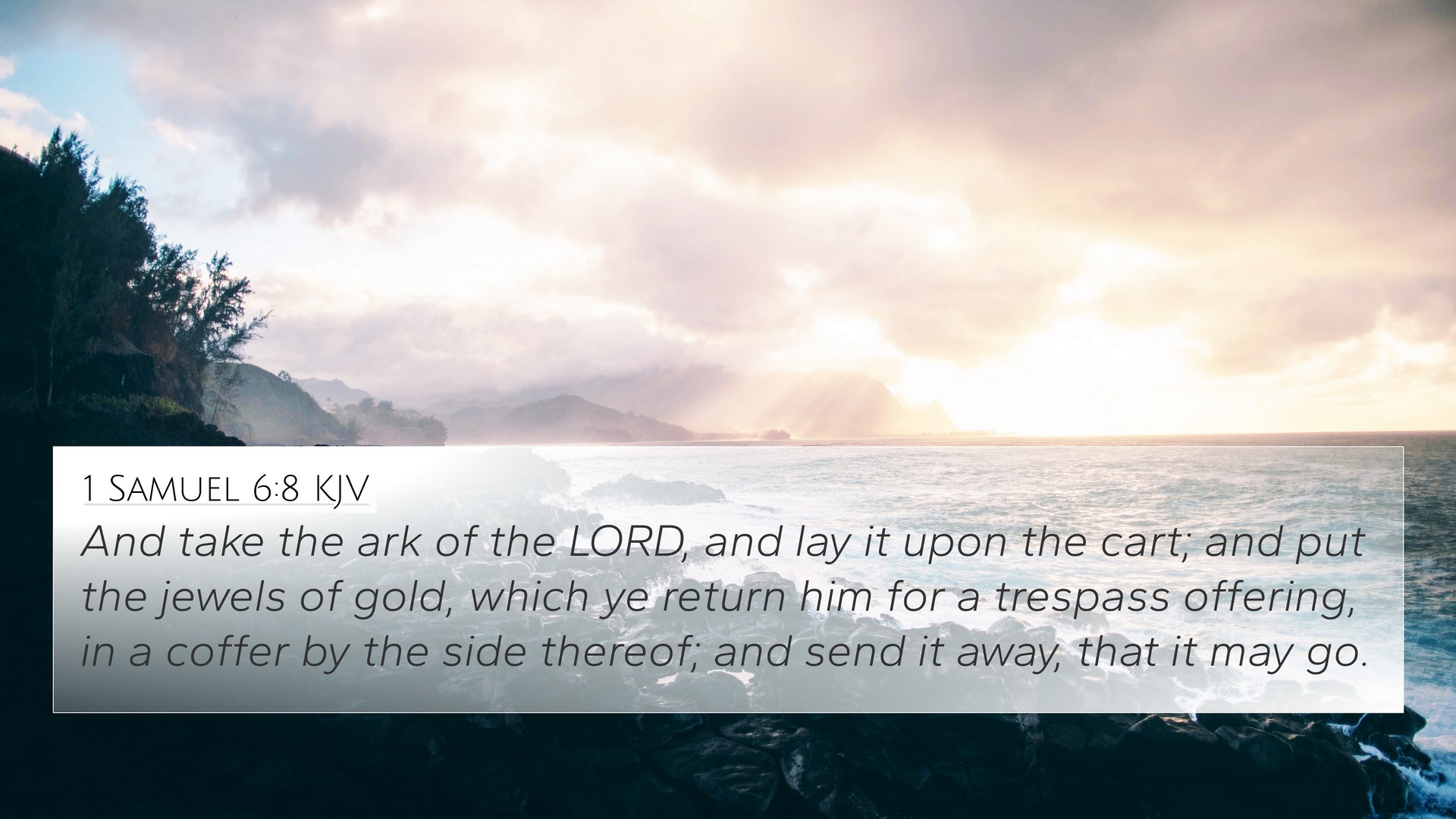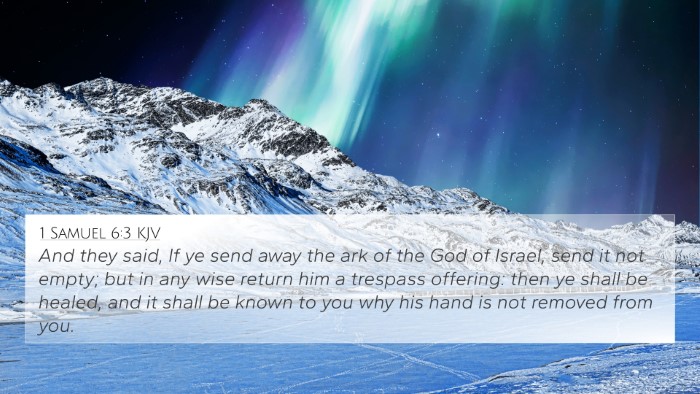Understanding 1 Samuel 6:8
Verse: 1 Samuel 6:8 - "And take the ark of the LORD, and lay it upon the cart; and put the jewels of gold, which ye return him for a trespass offering, in a coffer by the side thereof: and send it away, that it may go."
Summary of Meaning
This verse recounts the instructions given to the Philistines regarding how to return the captured Ark of the Covenant to Israel. The Ark represented God's presence among His people, and its capture was a significant blow to Israel. The Philistines, after suffering greatly since taking the Ark, sought to return it and appease the God of Israel. The laying of jewels as a trespass offering indicates an acknowledgment of wrongdoing and a desire for reconciliation.
Commentary Insights
The combined insights from public domain commentators highlight various thematic and theological implications of this verse.
-
Matthew Henry: Henry emphasizes the seriousness with which the Philistines approached the Ark's return. He points out their recognition of the power of the God of Israel and their desire to make amends through the tokens of gold. This reflects a mindset of humility and fear of the divine.
-
Albert Barnes: Barnes elaborates on the significance of the sacrificial offering. He interprets the jewels as representing the notion of restitution, pointing out that this act illustrates the principle of making amends when one has wronged another or, in this case, a divine authority.
-
Adam Clarke: Clarke offers a deeper historical context, exploring how the Ark's presence affected the Philistine cities. The return of the Ark was not merely a physical act but a theological one, indicating the acknowledgment of God's sovereignty over all peoples, including the Philistines.
Cross-References and Thematic Connections
This verse can be connected with several other scriptures that illuminate its themes of repentance, divine authority, and the significance of the Ark:
- Exodus 25:22: Discusses the place of the Ark and God's communication with His people.
- 1 Samuel 4:11: Highlights the capture of the Ark by the Philistines.
- Isaiah 63:10: Mentions the consequences of resisting God’s Spirit, paralleling the Philistine experience.
- 2 Samuel 6:2: Details David's efforts to bring the Ark back to Jerusalem, further establishing its importance.
- Luke 19:8: The theme of restitution found in the story of Zacchaeus resonates with the Philistines' offerings.
- Romans 11:32: Discusses the concept of all disobedience leading to mercy, akin to the Philistines’ humbling before God.
- Hebrews 9:4: Provides clarification on the contents of the Ark, deepening the understanding of its significance.
- Acts 19:15: Illustrates the importance of knowing the authority behind spiritual matters similar to the Philistines’ acknowledgment.
How This Verse Connects Within the Biblical Narrative
Understanding 1 Samuel 6:8 requires an exploration of its place in the larger biblical narrative. The act of returning the Ark shows that the repercussions of sin against God extend beyond one nation. It sets a precedent in understanding inter-Biblical dialogue on themes of repentance and restoration.
Bible Verse Cross-References
Engaging in cross-referencing of this verse aids in comprehending its richness:
- Numbers 5:7: Details the steps in making restitution, relating to the Philistines' actions.
- Matthew 5:23-24: Teaches about making reconciliation, echoing the sentiments of 1 Samuel 6:8.
- 1 Peter 2:9: The idea of being a chosen people relates back to how God interacts with nations.
Tools for Bible Cross-Referencing
For those exploring the connections between Bible verses and wanting to dive deeper into comparative Bible verse studies, several resources may aid in this endeavor:
- Bible Concordance: A classic tool for locating keywords and themes across scripture.
- Bible Cross-Reference Guide: Provides organized comparisons to enhance understanding.
- Cross-Reference Bible Study: Methodologies for structured study of interrelated scriptures.
- Bible Reference Resources: Compilations of themes and teachings across the canon.
Conclusion
1 Samuel 6:8 serves as a pivotal point in the narrative of God's relationship with Israel and the Gentile nations. It not only highlights the importance of the Ark but underscores the broader themes of repentance and the recognition of God's authority. Through cross-referencing other Bible verses, one can capture the depth and implications of this scripture and its relevance in both Old and New Testament teachings.



